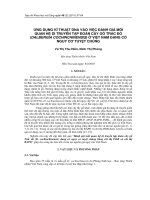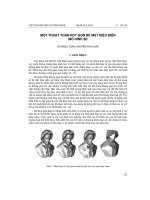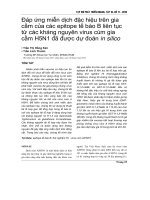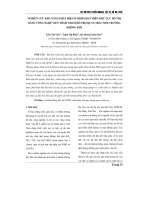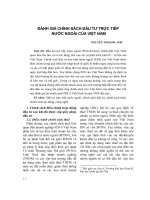3259-5523-1-PB
Bạn đang xem bản rút gọn của tài liệu. Xem và tải ngay bản đầy đủ của tài liệu tại đây (245.25 KB, 9 trang )
Information and Knowledge Management
ISSN 2224-5758 (Paper) ISSN 2224-896X (Online)
Vol 2, No.7, 2012
www.iiste.org
Factors that Influence Oral Presentations of Engineering Students of
Pakistan for Workplace Environment
Inayatullah Kakepoto1,2,*, Hadina Habil3, Noor Abidah Mohd Omar3, Hamdan Said4
1
Faculty of Education, Universiti Teknologi Malaysia, Johor Bahru, Johor, 81310 Malaysia.
2
Basic Science & Related Studies, Quaid-e-Awam University of Engineering Science & Technology
Nawabshah (Sind) 67480 Pakistan
3
Language Academy, Universiti Teknologi Malaysia Johor Bahru, Johor, 81310 Malaysia
4
School of Graduate Studies, Universiti Teknologi Malaysia Johor Bahru, Johor, 81310 Malaysia
*Corresponding author: ,
Abstract
Oral presentations have acquired significant importance in the world of work especially in the field of engineering.
Industry demands a new type of engineer equipped with new competencies and skills to promote business of
organizations. Twenty five (25) engineering students from 2 engineering universities of Pakistan participated in this
study. Purposive sampling method was used for data collection since participants were selected on specific criteria of
only final year engineering students. All presentations were video recorded to capture actual barriers than perceived
barriers of engineering students. Data were analyzed qualitatively through oral presentation assessment rubric. This
assessment rubric contained four traits such as presentation skill, confidence, nervousness and vocal variety. Three
assessors assessed these oral presentations in order to overcome researcher bias. The results of the study indicated
that poor presentation skill, poor confidence and nervousness influenced effective oral presentation performance of
engineering students. The findings of the study can be used as a guideline to prepare better human capital for
workforce which is demand of modern industry to increase its workplace productivity.
Keywords: Oral presentations, engineering students, workplace environment
1. Introduction
Corporate economies are consistently pushing organizations to focus competencies of its new hires because
engineering graduates equipped with effective oral presentation skills contribute to increase workplace productivity
of organizations at a large measure. In view of this, corporate recruiters demand well rounded engineers equipped
with technical and non technical skills to boost business of organizations at global level. Oral presentation is an
important aspect of modern workplace and engineering students have to perform oral presentations to promote
business of organizations at domestic as well as global level. The purpose of this research was to explore factors that
influenced effective oral presentation performance of engineering students since poor presentation skills of
engineering students are never in their own better interest nor engineering organizations.
2. Literature Review
Oral communication skills in the workplace include oral presentation, participation in meetings, discussion,
conversation, and negotiation skills. Among these skills oral presentation occupies a central position in the workplace.
This is because it assists engineers to perform workplace jobs effectively and promote business of organizations at
international level. Employers consider communication skills more important than technical skills (McPherson, 1998)
because the work environment of organizations has become global resultantly engineering organization demand
effective communication such as oral presentation skills of engineering graduates. In addition, organizational
influences such as increased competition and technology constantly pressurize engineers to play diverse roles
(Farr1996) at workplace. Moreover, the way of doing old fashioned things can be effective but no more efficient in
this modern age (Redmann et al., 2004) of industrialization. Effective oral communication skills such as oral
presentation skills are required skills to be successful in any profession (Luthy, 2006) and research over the years
70
Information and Knowledge Management
ISSN 2224-5758 (Paper) ISSN 2224-896X (Online)
Vol 2, No.7, 2012
www.iiste.org
indicates that oral presentation is an important attribute of an engineer in order to be successful in engineering
profession. Engineers have to perform oral presentations to keep management of the organization well abreast about
progress of industry projects and barriers that hamper timely completion of company projects. Truly speaking,
employers can never bear losses due to delayed completion of industrial projects. In this perspective, they need daily
briefings about work progress of company projects. In other words, employers conduct meetings with engineers on
regular basis to get briefings on progress of initiated company projects. Research has found that engineers usually
perform oral presentations (Hafizoah Kassim et al., 2010) thus; they need to be proficient in oral presentations
(Bhattacharyya et al., 2009).
Oral presentations have acquired significant position in academics (Campbell et al., 2001) ranging from medical and
engineering fields. Oral presentation is one of the seven important oral communication skills that entry level job
candidates should possess (Campbell et al., 2001). Truly speaking, the professional competence modern engineer is
based on his or her technical skills such as communication, oral communication and presentation skills. Effective
communication, oral communication and presentation skills make engineering graduate valuable for modern industry.
On the contrary, engineering graduates who lack in these skills are never productive for organizations and tend to be
burden on financial health of organizations. The engineer of twenty first century should be different from past decade
engineers (Radzuan et al., 2008) in terms of communication skills that are usually called soft skills. Soft skill is a
very broad term and under this umbrella many skills work which are considered valuable skills for engineers in this
competitive work environment of organizations. In fact, oral presentation is an attribute of an engineer that assists
him to perform workplace jobs effectively that ultimately leads towards workplace productivity.
Engineering students need to be required to perform oral presentations within a certain length of time in academic
settings. Thus, they need appropriate preparation for this presentation. No doubt, oral presentations require
confidence of speakers to speak in front of familiar and unfamiliar audience. In this perspective, this tends to be the
responsibility of effective speakers to develop audience interest during presentation. It has been best seen that of
speakers or teachers usually fail to develop audience or students interest and let them allow fall asleep during
presentation, briefings, seminars, conferences or classrooms. This tends to be surprising although oral presentations
occupy central position at workplace but engineering students of Pakistan are provided few oral presentation
opportunities during study time. Resultantly, these engineering students face barriers during job interviews and at
workplace. Moreover, employers tend to be reluctant to assign them important job positions at workplace because
they are never considered productive for organizations. According to Campbell et al. (2001) in a university setting
students are provided few oral presentations. In fact, skills are learned (Maes et al., 1997) and through effective
communication skill trainings engineering students of Pakistan can be prepared better human capital for the
workplace.
Anderson and Bolt (2008) noted that students lack in presentation skills entering the workplace. Although
engineering students desire to perform effective oral presentations in academic and non academic setting but it tends
that still their desire remains unfulfilled. Research has also identified that engineers face communication barriers
giving presentations in seminars, conferences and the workplace (Kedrowicz, 2006; Orr et al., 2005; Freeman, 2003;
King, 2002; Polack-Wahl, 2000). Katz (1993) interviewed professionals from industry. Professionals responded that
communication skills of modern graduates are not good; they are less than not good, they are really bad. King (2002)
illustrated that poor presentation skill obstructs students’ effective presentations. Due to poor oral communication
skill students often experience failure on the job (Cangelosi et al., 1998). Thus, poor oral communication skill
deficiency develops poor image for engineers at workplace. According to Riemer (2002) poor communication skill
leads to undermine whole profile of an engineer. Baytiyeh et al. (2010) illustrated that students’ desire a job that
improves their professional growth, but when they start work at workplace they face realities of sustained work
(Hettich 2000).
Confidence is an essential aspect of any good presentation. It provides impetus to speakers to communicate his or her
ideas effectively. Due to confidence speakers maintain direct communication with audience. It has been best seen
that although engineering students face barriers but due to confidence they succeed to complete oral presentations.
On the contrary, engineering students equipped with low self confidence tend to fail to complete whole presentations.
In certain instances due to low self confidence they shorten their presentations and leave the rostrum. According to
Schunk (1991) students quit oral presentations due to low self confidence. On the other front, audience likes
71
Information and Knowledge Management
ISSN 2224-5758 (Paper) ISSN 2224-896X (Online)
Vol 2, No.7, 2012
www.iiste.org
confidence of speakers (Wardrope et al., 1994) and for many speakers oral presentation is just like fear of death
(Glossophobia, 2001). Organizations require employees with confidence (Dam et al., 2004). Low self confidence can
hamper graduates to be hired for workplace jobs (Zeigler, 2007). A study was conducted by Oliver Rhonda et al.
(2005) on “communicative competence in oral language assessment” indicated that students faced lack of confidence
in certain situations.
Nervousness is the most common factor that hinders effective oral presentation performance of many speakers
including engineers and engineering students in academic and non academic settings. According to Miller (2005)
speakers are never judged only from communication but they are judged by the image they transfer during
communication performance. Truly speaking, for many engineering students oral presentation is never without
nervousness, and it leaves negative impact on oral presentation performance (Tisdale, 2005) of engineering students.
Richmond et al. (1995) reported that between 70 to 75% individuals fear from oral communication performance.
Ayres (1998) noted that nervous engineering students spend more time on oral presentation preparation compared to
low nervous peers. In view of this, engineering students should practice oral presentations to overcome barriers that
obstruct their effective oral presentation performance and it is in the better interest of many stakeholders including
industry, engineering universities and employers.
3. Methodology
The research approach used for this study was based on qualitative methods in terms of observation of recording of
oral presentations. Video recordings provided insights to assess factors that influenced effective oral presentation
performance of engineering students.
3.1 Sample
Twenty five (25) engineering students from 2 engineering universities of Pakistan participated in this study.
Purposive sampling method was used since respondents were chosen on specific criteria of only final year
engineering students. Creswell et al. (2007) illustrated that purposive sampling assists researchers to select suitable
respondents for the study. The notion behind selection of final year engineering students was based on the
understanding that within six months these engineering students shall become part of workplace. In this perspective,
it was necessary to assess factors that influence their effective oral presentation performance.
3.2 Instruments
Video recordings were used as an instrument for this study. Participants were given choice for topic selection. In
other words, it was a prerequisite demand of many engineering students. The main actors for this oral activity were
engineering students.
3.3 Participant Characteristics
All participants were undergraduate final year engineering students and they come from the discipline of civil
engineering and electrical engineering.
4. Data Analysis
Data were analyzed qualitatively but results were presented quantitatively in terms of percentages for each trait
included in the assessment rubric. The assessment rubric used for this study was partially adopted from “Impact of
Digital Video on Communication Skills in Business Education” (Leeds Elke M., 2007). Oral presentation traits used
in Leeds Elke M. (2007) study were ‘credibility or confidence’, ‘eye contact or absence of reading’, ‘appearance
nervous mannerisms’, ‘gestures or the purposeful use of the body ‘and ‘vocal variety’. However, the assessment
rubric used for this study was ‘presentation skill’ (speaker communicates ideas clearly and effectively), ‘confidence’
(speaker appears confident and knowledgeable), ‘nervousness’ (presenter displays non purposeful body movements
and nervous gestures) and ‘vocal variety’ (speaker speaks clearly, avoids verbal pauses and pronunciation problems
during presentation). A 5 point likert scale based on ‘strongly disagree’, ‘disagree’, ‘undecided’, ‘agree’ and ‘strongly
agree’ were used to assess factors that influenced oral presentation performance of engineering students.
72
Information and Knowledge Management
ISSN 2224-5758 (Paper) ISSN 2224-896X (Online)
Vol 2, No.7, 2012
www.iiste.org
5. Study Results
The research results provided valuable insights on factors that influenced effective oral presentation performance of
engineering students. The findings are presented in percentages on the basis of assessors’ agreement and
disagreement for the factors that influenced oral presentation performance of engineering students.
5.1 Presentation Skill
The results for presentation skill of engineering students indicated that 1% responses were recorded as strongly
disagreed, 64% disagreed, 0% undecided, 31% agreed and 4% strongly agreed that engineering students possess
effective oral presentation skill (Fig.5.1). Thus, results indicate that 64% engineering students possess poor
presentation skill to perform effective oral presentations.
5.2 Confidence
The results for confidence of engineering students indicated that 3% responses were recorded as strongly disagreed,
53% disagreed, 0% undecided, 40% agreed and 4% strongly agreed (F.5.2). Thus, results indicate that 53%
engineering students possess poor confidence to perform effective oral presentations.
5.3 Nervousness
The results for nervousness of engineering students indicated that 0% responses were recorded as strongly disagreed,
10% disagreed, 0% undecided, 87% agreed and 3% strongly agreed (F.5.3). Thus, results indicate that 87%
engineering students face nervousness to perform effective oral presentations.
6. Discussion
The first finding of the study was that poor presentation skill influenced effective oral presentation performance of
engineering students. The findings support the idea of Anderson & Bolt (2008) that students lack in presentation
skills entering the workplace. Moreover, literature review also suggests that modern engineering graduates possess
poor communication skills such as poor oral presentation skills. Katz (1993) interviewed professionals from industry
in order to obtain information about communication skills modern graduates. The results of this study indicated that
communication skills of modern graduates are not good; they are less than not good, they are really bad. The second
finding of the study was that poor confidence influenced effective oral presentation performance of engineering
students. Literature review also suggests that engineering students possess poor confidence for oral presentations.
Oliver Rhonda et al. (2005) conducted a study on “communicative competence in oral language assessment”. The
results of the study revealed that students faced lack of confidence in certain situations. The third finding of the study
was that nervousness influenced effective oral presentation performance of engineering students. Literature review
also suggests that engineering students face nervousness during oral presentations. Majority of students face
nervousness during oral presentation (Lucas, 2001) and nervous engineering students spend more time on oral
presentation preparation compared to low nervous peers (Ayres, 1998). It is envisaged that if oral presentation
barriers of engineering students of Pakistan are not redressed at university level as a result, these barriers shall affect
their job performance at workplace. Thus, this tends to be the responsibility of engineering universities of Pakistan to
prepare better human capital for workplace equipped with technical and non technical skills such as oral presentation
skills. Additionally, it is suggested that engineering students should take interest in non engineering subjects such as
communication, oral communication and oral presentation skills if they want to be successful in this competitive
business environment of organizations.
7. Conclusion
The results of the study indicated that poor presentation skill, poor confidence and nervousness influenced effective
oral presentation performance of engineering students. Resultantly, these obstacles shall affect their job performance
at workplace which is never in the better interest of organizations. In view of this, it is suggested that communication
teachers should assist engineering students to overcome oral presentation barriers during study time. Moreover, it is
73
Information and Knowledge Management
ISSN 2224-5758 (Paper) ISSN 2224-896X (Online)
Vol 2, No.7, 2012
www.iiste.org
the responsibility of engineering universities of Pakistan to add more communication courses that focus oral
presentation skills of engineering students. Thus, they can prepare productive engineers for organizations. There is
no exception and doubt that engineers equipped with poor presentations are never productive for organizations. In
this perspective, industry and engineering universities of Pakistan should arrange oral presentation skill trainings for
engineering students during study time and following graduation at workplace if they want to increase workplace
productivity of organization. A productive engineer is in the better interest of all the stakeholders who are directly or
indirectly related with engineering profession. Moreover, skilled engineers would assist to overcome increasing
unemployment in engineering profession of Pakistan.
References
Anderson, L. E. and S.B. Bolt (2008). Professionalism: Real skills for workplace success.Upper Saddle River,
NJ: Prentice Hall.
Ayres, J., Keereetaweep, T., Chen, P, E., and Edwards, P. A. (1998). Communication apprehension and
employment interviews. Communication Education, Vol. 47, pp. 1- 17.
Baytiyeh, H. and Naja, M. (2010). Students’ enrolment in engineering: motivational factors. International
Journal of Engineering Education. Vol. 26 (5), pp. 1192–1199.
Bhattacharyya, E., Nordin, S.M. & Salleh, R. (2009). Internship Students' Workplace Communication Skills:
Workplace Practices and University Preparation. Proceedings for the CIEC Conference, Florida, Orlando,
USA.
Campbell, K. S., Mothersbaugh, D. L., Brammer, C., and Taylor, T. (2001). Peer versus Self-Assessment of
Oral Business Presentation Performance. Business Communication Quarterly. Vol. 64(3), pp.23-42.
Cangelosi, B. R., and Peterson, M. L. (1998). Peer Teaching Assertive Communication Strategies for the
Workplace. Montgomery, AL: Auburn University at Montgomery, School of Education.
Creswell, J. and Plano Clark, V. (2007). Designing and Conducting Mixed Methods Research. Thousand Oaks,
CA: SAGE Publications.
Dam, G. and Volman, M. (2004). Critical thinking as a Citizenship Competence: Teaching Strategies. Learning
and Instruction. Vol. 14(4), pp. 359-379.
Farr, J.V. (1996). The Impacts of Technology on Engineering Education. Journal of Management
Engineering. Vol. 2(6), pp.25-26.
in
Freeman, J. (2003). The Science of Conversation: Training in Dialogue for NNS in Engineering.
Transactions of Professional Communication. Vol. 46 (3), pp.157-167.
IEEE
Glossophobia (2001). Do you
/>
suffer
from
glossophobia?
Retrieved
15 October,
Hafizoah Kassim and Fatimah Ali (2010). English Communicative Events and Skills Needed
Workplace: Feedback from the Industry. English for Specific Purpose. Vol. 29(3), pp. 168-182.
2012,
from
at
the
Hettich, P., 2000. Transition Processes from College to Career. Proceedings of the 108th American
Psychological Association. Washington, DC: American Psychological Association.
Katz, S. (1993). The Entry-Level Engineer: Problems in Transition from Student to Professional. Journal of
Engineering Education. Vol. 82(3), pp.171-174.
Kedrowicz, A. (2006). Let me Explain: Student Attributions during Face-to Face Performance Feedback,
National Communication Association Convention.
clear/Let%20me%20explain%20FINAL.pdf.
King, J. (2002). Preparing EFL learners for Oral Presentations. The Internet TESL
/>74
Journal, 3(3). Accessed at
Information and Knowledge Management
ISSN 2224-5758 (Paper) ISSN 2224-896X (Online)
Vol 2, No.7, 2012
www.iiste.org
Leeds, Elke M. et al. (2007). Impact of Digital Video on Communication Skills in Business Education. A PhD
Dissertation Walden University.
Luthy, Michael R. (2006). Educating tomorrow’s Sales Professionals: Perspectives from Senior-level Service
Executives, Allied Academies International Internet Conference – Academy of Educational Leadership
Proceedings, 62- 66.
Maes, J. D., Weldy, T. G., & Icenogle, M. L. (1997). A Managerial Perspective: Oral Communication
Competency is most important for Business Students in the Workplace. Journal of Business Communication.
Vol. 34 (1), pp.67-80.
McPherson, B. (1998). Student Perceptions about Business Communication in their Careers. Business
communication Quarterly, Vol. 6(21), pp.68-79.
Miller, Patrick W. Body Language: An Illustrated Introduction for Teachers. Patrick W. Miller Associates, 2005.
Orr, T.,Yamazaki, A., Gupta, R., and Anthony, L. (2005). Oral Presentations in International
Contexts:
Published advice, actual practice, problematic issues. Paper presented at the 2005 IEEE International
Professional Communication Conference Proceedings, pp. 54-64.
Polack-Wahl, J.A., It is time to stand up and communicate. Proceedings 30th ASEE/IEEE Frontiers in Educ.
Conf., Kansas City, USA, F1G-16- F1G-21 (2000).
Radzuan Raha Noor Mohd, Sarjit Kaur (2011). Technical Oral Presentations in English: Qualitative analysis of
Malaysian engineering undergraduates’ sources of anxiety. Procedia -Social and Behavioral Sciences 29 (2011)
1436 -1445.
Redmann, D.H, and Kotrlik, J.W. (2004). Technology Integration into the Teaching- learning
Business Education Teachers. The DeltaPi Epsilon
Journal, XLVI (2), 76-91.
process
by
Rhonda Oliver, Yvonne Haig and Judith Rochecouste (2005): Communicative Competence in Oral Language
Assessment, Language and Education, 19(3), 212-222.
Riemer Marc (2002). English and Communication Skills for the Global Engineer. Global Journal of
Engineering Education. Vol. 6(1), pp.91-100
Schunk, D. H. (1991). Self-Efficacy and Academic motivation. Educational Psychologist. Vol. 26(3, 4), pp.
207-231.
Tisdale, J. J. (2005). Effective Business Presentations. Upper Saddle River, N.J.: Pearson Education, Inc.
Wardrope, W. J. (2002). Department chairs' Perceptions of the importance of Business Communication Skills.
Business Communication Quarterly. Vol. 65(4), pp.60-72.
Zeigler, R. (2007). Student perceptions of "soft" skills in Mechanical Engineering. ICEE 2007 Conference.
Retrieved 13th October 2010, from proceedings/papers/505.pdf
Biographical Notes
Inayatullah Kakepoto earned his Master of Arts (English Literature) from Shah Abdul Latif
University Khairpur (Sind) Pakistan. His teaching experience is spread more than over a decade as
Lecturer at Cadet College Petaro (Pakistan Navy) and as Assistant Professor Quaid-e-Awam
University of Engineering Science and Technology Nawabshah (Sind) Pakistan. Currently he is a
doctoral student at Universiti Teknologi Malaysia. His research interests include workplace
communication, soft skills, business communication and engineering education.
Hadina Habil earned her PhD (Language and Communication) from Universiti Putra Malaysia. She is currently
working as Associate Professor and Deputy Dean (Language Academy) Universiti Teknologi Malaysia. Her research
interests include English for specific purposes, language & communication, business communication, discourse
analysis, TESL, and workplace communication.
75
Information and Knowledge Management
ISSN 2224-5758 (Paper) ISSN 2224-896X (Online)
Vol 2, No.7, 2012
www.iiste.org
Noor Abidah Mohd Omar earned her PhD (Management and Modern Language) from Aston United Kingdom. She
is currently working as Associate Professor and Dean (Language Academy) Universiti Teknologi Malaysia. Her
research interests include English language syllabus and curriculum design, English for specific purposes, English
for academic purposes, grammar and English language structures.
Hamdan Said earned his PhD (Educational Leadership-Higher Education Administration) from
IOWA State University United States of America. He is currently working as Associate Professor
(Faculty of Education) Universiti Teknologi Malaysia and Deputy Dean (Social Science) School of
Graduate Studies Universiti Teknologi Malaysia. His research interests include educational
leadership and leadership and management.
Appendix:
Figure 1: Assessors Agreement and Disagreement with Presentation Skills of Engineering Students
76
Information and Knowledge Management
ISSN 2224-5758 (Paper) ISSN 2224-896X (Online)
Vol 2, No.7, 2012
www.iiste.org
Figure 2: Assessors Agreement and Disagreement with Confidence of Engineering Students
77
Information and Knowledge Management
ISSN 2224-5758 (Paper) ISSN 2224-896X (Online)
Vol 2, No.7, 2012
www.iiste.org
Figure 3: Assessors Agreement and Disagreement with Nervousness of Engineering Students
78
